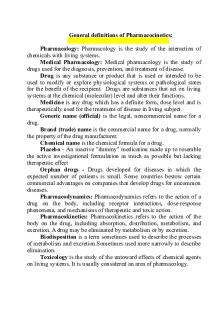Chapter 2 terms for review ENGL 1204 PDF

| Title | Chapter 2 terms for review ENGL 1204 |
|---|---|
| Course | Reading and Writing about Genre: An Introduction to Literature |
| Institution | Kwantlen Polytechnic University |
| Pages | 1 |
| File Size | 32.8 KB |
| File Type | |
| Total Downloads | 65 |
| Total Views | 137 |
Summary
Book vocabulary for chapter 2...
Description
Chapter 2 terms for review: ENGL 1204 Total Omniscience: A POV in which the narrator knows everything about the story about the characters and even the events. Narrators with total omniscience are capable of moving freely from one character to another. Generally this type of narrative is written in 3rd person. Limited or selective omniscience: The POV in which the narrator sees into the minds of some characters but not all of them. Most typically limited omniscience sees through the eyes of minor or major characters. Impartial Omniscience: The POV employed when an omniscient narrator who present the thoughts and actions of characters, does not judge them or comment on them. Editorial Omniscience: POV employed when an omniscient narrator goes beyond reporting the thoughts of his characters to make critical judgments or commentary, making explicit the narrator's own thoughts or attitudes. Objective Point of view: POV in which the third person narrator merely reports the dialogue and action with little to no interpretation or access to the characters minds. Omniscient or all knowing narrator: a narrator who has the ability to move freely through the consciousness of any character. The omniscient narrator also has complete knowledge of all of the external events in a story. Participant or first person narrator: a narrator who is participant in the action. Such a narrator refers to himself herself as “I” and may be a major or minor character in the story. Observer: A first person narrator who is relatively detached from or plays only a minor role in the events described. Non Participant or third person narrator: a person that does not appear in the story as a character but is usually capable of revealing the thoughts and motives of one or more characters. Innocent/Naive narrator: a character who fails to understand all the implications of the story he or she tells. The innocent narrator often takes the role of a child or a child like adult - is frequently used by an author to generate irony, sympathy, or pity by creating a gap between what the narrator perceives and what the reader knows. Unreliable narrator: a narrator who intentionally or unintentionally relates events in a subjective or distorted manner. The author usually provides some indication early on in such stories that the narrator is not to be completely trusted. Interior monologue: an extended presentation of a character's thoughts in a narrative. Usually written in the past tense and printed without quotation marks, an interior monologue reads as if the character were speaking aloud to himself or herself, for the reader to overhear. Stream of consciousness: a type of modern narration that uses various literary devices, especially interior monologue in an attempt to duplicate the subjective and associative nature of human consciousness....
Similar Free PDFs

Terms and clues FOR LET Review
- 14 Pages

ISP Mid Terms- Chapter 2
- 7 Pages

Review for Chapter 10
- 2 Pages

CPT6 Chapter Review chapter 2
- 4 Pages

Main terms for pharmacology
- 9 Pages

Chapter 2 Review Guide
- 3 Pages

Chapter 2 Review Quiz
- 4 Pages

Chapter 2 Review Questions
- 4 Pages

Review Questions Chapter 2
- 14 Pages

Chapter 2 review answers
- 4 Pages
Popular Institutions
- Tinajero National High School - Annex
- Politeknik Caltex Riau
- Yokohama City University
- SGT University
- University of Al-Qadisiyah
- Divine Word College of Vigan
- Techniek College Rotterdam
- Universidade de Santiago
- Universiti Teknologi MARA Cawangan Johor Kampus Pasir Gudang
- Poltekkes Kemenkes Yogyakarta
- Baguio City National High School
- Colegio san marcos
- preparatoria uno
- Centro de Bachillerato Tecnológico Industrial y de Servicios No. 107
- Dalian Maritime University
- Quang Trung Secondary School
- Colegio Tecnológico en Informática
- Corporación Regional de Educación Superior
- Grupo CEDVA
- Dar Al Uloom University
- Centro de Estudios Preuniversitarios de la Universidad Nacional de Ingeniería
- 上智大学
- Aakash International School, Nuna Majara
- San Felipe Neri Catholic School
- Kang Chiao International School - New Taipei City
- Misamis Occidental National High School
- Institución Educativa Escuela Normal Juan Ladrilleros
- Kolehiyo ng Pantukan
- Batanes State College
- Instituto Continental
- Sekolah Menengah Kejuruan Kesehatan Kaltara (Tarakan)
- Colegio de La Inmaculada Concepcion - Cebu





